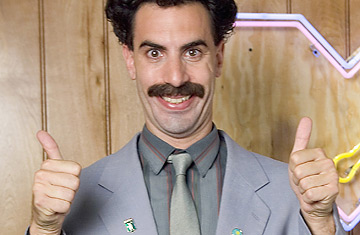
Sacha Baron Cohen as Borat
The fact that a movie satirizing anti-Semitism opened around the same time that Hizballah launched a campaign of protests to bring down the Lebanese government is surely mere coincidence, and not evidence of a subtle Hollywood-Jewish plot to undermine the Islamist group's anti-Israel agenda. Nevertheless, it remains remarkable that Borat played in Lebanon at all.
When Georges Hadadd, the head of Empire cinema, one of the largest distributors in the Middle East, decided to buy the rights to distribute Borat, half his staff thought he was crazy. "And not for reasons you might expect," he said from his office above the company theaters in a Beirut shopping mall. "Not because of all the Jewish stuff."
The risk was less political than it was commercial: Would anyone get the joke in a movie that casts a British comedian as a reporter from Central Asia on a road trip across America to marry Baywatch star Pamela Anderson? Or more to the point, would a region known for its piety tolerate, let alone patronize, a movie that shows the jiggling hindquarters of a prostitute in hot pants riding a mechanical bull, or, in another scene, two guys rolling around naked at a mortgage brokers' conference? "I don't want to call Borat an 'art' film," said Haddad. "But it is a special film that requires special handling. Watching two men rolling around naked is not acceptable in our culture. Two women? Maybe."
Haddad decided right away that Borat was not ready for prime time in most of the Middle East, in part because it portrays Kazakhstan as a country rife with incest, rape and disco dancing. "Many of these countries, especially in the Gulf, have economic ties to Khazakstan, and the idea of turning a poor Muslim country into something ridiculous would be insulting. They are not going to understand that that's being exaggerated to make people laugh."
Instead, Empire distributed the movie only in Haddad's native Lebanon, arguably the most sophisticated media market in the Middle East, where many are familiar with the TV work of Borat's creator, Sasha Baron Cohen. But audience sensibility wasn't the only obstacle in Borat's path: Movies in Lebanon are tightly monitored by a censorship board attached to the General Security Directorate, the country's most powerful intelligence institution. The board has traditionally banned or censored movies that contain anything that might be construed as Israeli propaganda, anything sexually explicit, and anything that might incite or insult any one of Lebanon's 17 different recognized religious sects.
One would have thought that the spectacle of Borat cavorting in fishnet underwear or speaking in tongues at a Pentecostal prayer meeting, a rodeo cowboy equating Arabs and Muslims with suicide bombers, or Borat's attempt to buy a handgun suitable for Jew-killing, would have tripped the censors' sensors. But Borat has gone almost the length of its commercial run without public outcry — and, as far as I could tell, without a single cut from the original. In a random sampling, Lebanese audiences laughed at the same moments as did those in New York, though film critics at a special preview arranged for the Lebanese press were surprised to learn that there was anti-Semitism in America. "In the Middle East, all we know is that America and Israel are always together," said one.
One explanation for Borat's smooth ride in Lebanon may be that the country's intelligence services aren't what they used to be. The former head of General Security, Jamil Sayed (who was also the former head of the film board) is currently in prison under suspicion for involvement in the assassination of former Lebanese Prime Minister Rafik Hariri. And since the Syrian withdrawal, local audiences have seen such racy fare as Brokeback Mountain and Munich, Stephen Spielberg's drama about Israel's campaign to avenge athletes slain by Palestinian terrorists at the 1976 Olympics. Lebanese cinema-goers are also now more likely to see the spicy bits usually excised from R-rated fare.
It may be tempting to read Borat's unmolested season on Lebanese screens as a sign of progress of the post-Syrian era towards a more tolerant, liberal society. But it could just as likely be the high water mark in a Weimar-like interregnum before the forces of reaction and intolerance reassert themselves. Outside of the theaters, Lebanese society is in the midst of a sense of humor failure. When a Lebanese television comedy show poked fun at Hizballah leader Hassan Nasrallah last year, his followers rioted, cutting off the road from Beirut airport. And with Hizballah firmly ensconced in central Beirut, no one dares laugh at the Sheik now.
Instead, Borat's equal-opportunity offensiveness is on par with so much else that the U.S. exports to the Middle East — it represents freedom without responsibility. As one Lebanese film critic said after seeing the movie: "The real message of Borat is that America is ridiculous." But people in the Middle East don't need to go to the movies to learn that.
